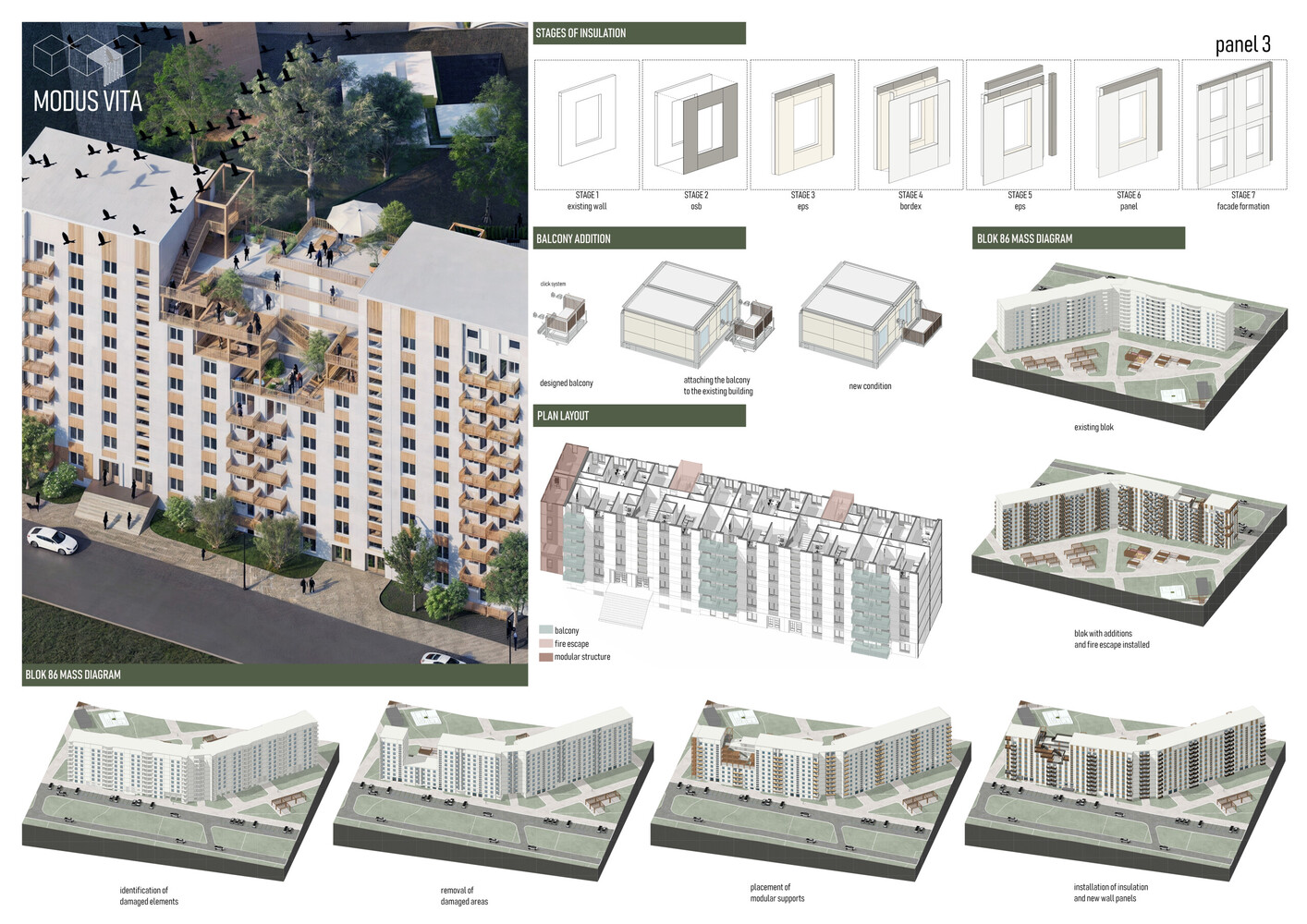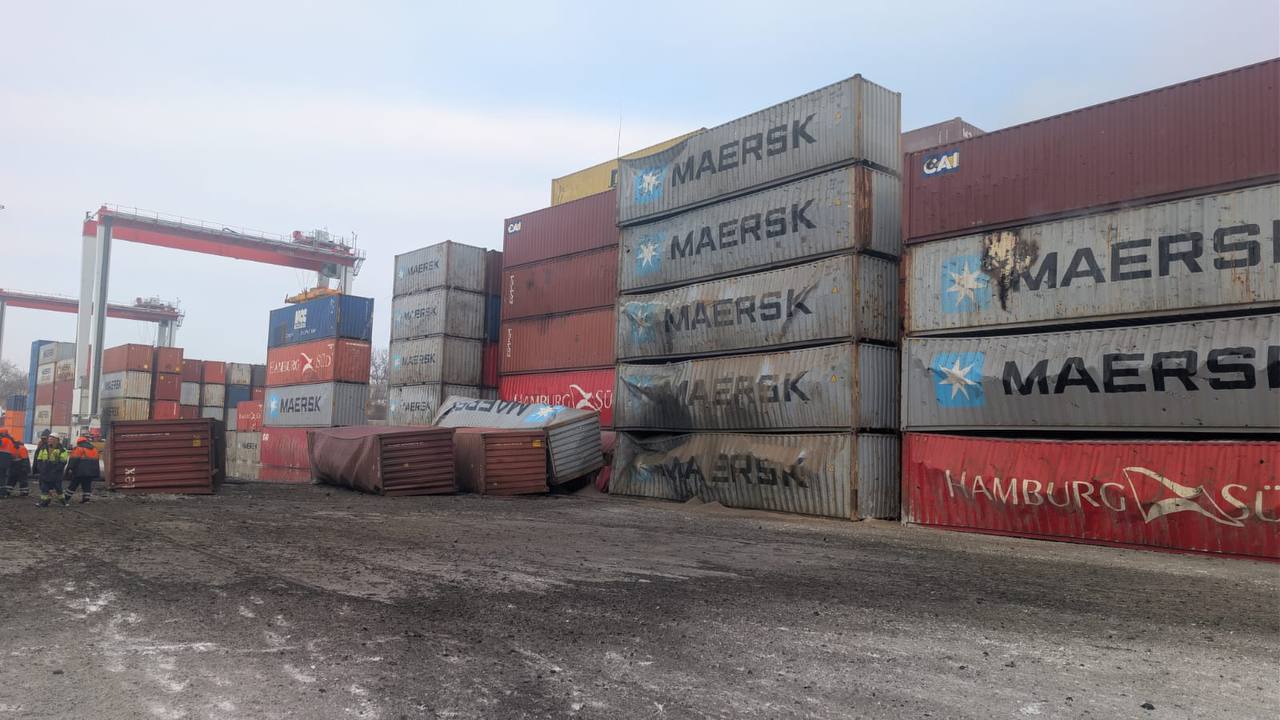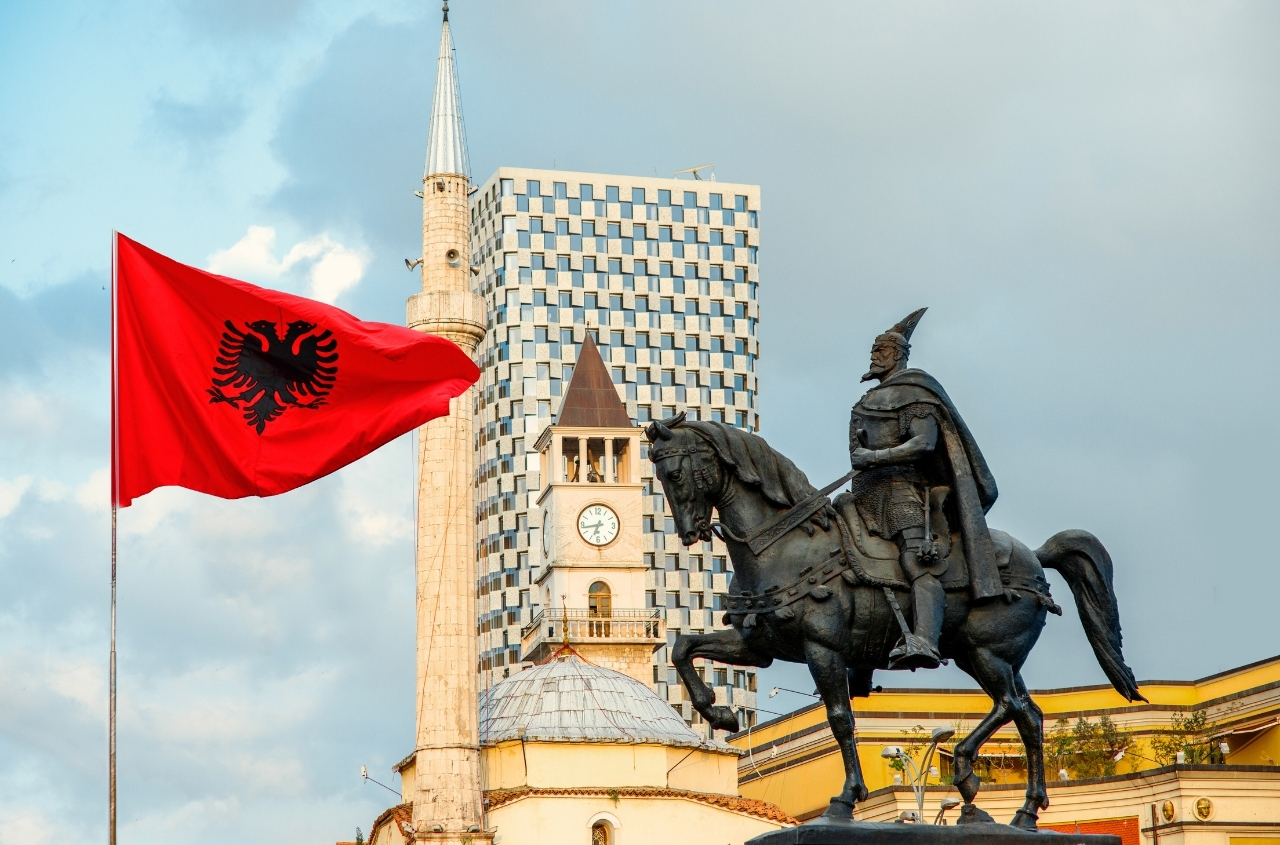Buildner has announced the results of the Kharkiv Housing Challenge, the first competition in a two-part series focused on rebuilding Ukraine. Kharkiv, Ukraine's second-largest city, has been deeply affected by the ongoing conflict, and this competition is part of a broader effort to rebuild its housing and public spaces.
As part of the Kharkiv Masterplan project—a joint initiative between the Kharkiv City Council, UNECE, the Norman Foster Foundation, Arup, and the Kharkiv Architects Group—the competition invited architects and designers to create modular systems for retrofitting existing concrete housing blocks and revitalizing public spaces. The proposals emphasized safety, energy efficiency, and community vitality, incorporating features such as bomb shelters and modular facades. They also offered solutions for rebuilding damaged structures with a modern design that reflects the local identity.
Buildner worked with an interdisciplinary jury panel with local, regional and international representation:
- Lord Norman Foster, President of the Norman Foster Foundation and founder of Foster + Partners, is renowned for promoting interdisciplinary thinking and sustainability in architecture, with major projects worldwide and a Pritzker Prize in 1999.
- Farshid Moussavi, Director of Farshid Moussavi Architecture and professor at Harvard GSD, is well known for her contributions to architecture, including serving on various academic and professional boards and being appointed an OBE in 2018.
- Igor Terekhov, Mayor of Kharkiv, has a background in construction and public administration, playing a key role in the city's development and receiving numerous awards for his leadership, especially during Ukraine's defense.
- Stuart Smith, Director at Arup, leads structural design projects globally, focusing on sustainability and circular economy principles, while also serving on the Holcim Foundation board and the Norman Foster Institute.
- Belinda Tato, founding partner of Ecosistema Urbano, is a Spanish architect known for her innovative urban designs like the Eco-boulevard in Madrid, and her focus on community engagement.
- Ammar Azzouz, a research fellow at Oxford, examines the impact of violence on urban environments, with a particular focus on Syria, and has published extensively on architecture and conflict.
- Yurii Spasov, head of "Kharkivproject Institute," is an architect responsible for numerous prominent buildings and urban regeneration projects in Kharkiv.
- Olga Demianenko, Advisor to the Mayor of Kharkiv, oversees international relations and coordinates major redevelopment projects for the city, including collaboration with the Norman Foster Foundation.
- Anna Soave, an urban development expert, leads UN-Habitat's Azerbaijan office and has extensive experience in post-conflict urban planning, having worked on recovery projects in Iraq and Afghanistan.
First Prize Winner
Project title: Healing Kharkiv: From Rubble to Renewal
Authors: Andrew James Jackson and John Edward Badman, of company Cundall in collaboration with Gensler, from the UK
This project focuses on reinforcing buildings with locally manufactured recycled materials, enhancing security, accessibility, and thermal insulation while expanding living spaces with winter gardens and terraces. It integrates sustainability by considering material reuse, water collection, and energy efficiency, with modular solutions that allow for flexibility based on the terrain. Public spaces are integrated with canopy structures for rainwater harvesting and green space preservation. The proposal emphasizes social cohesion and healing, reflecting a community-centered approach to reconstruction that involves local suppliers while addressing emotional and cultural recovery.
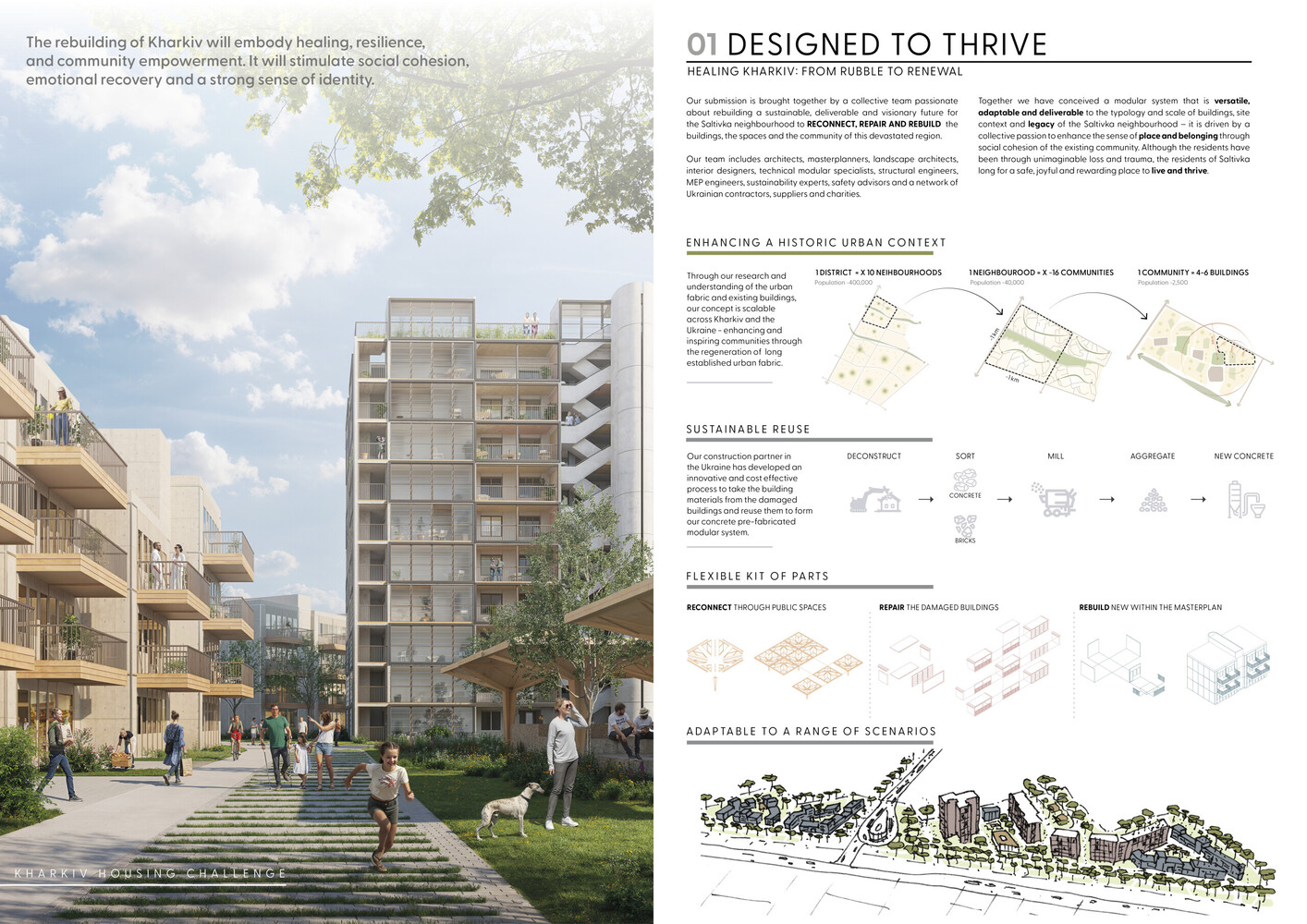
_1730884007.jpg/dR3dJtT7Cm6dlXrMWouhLz6OxgpzcNydWnZjUzg4.jpg)
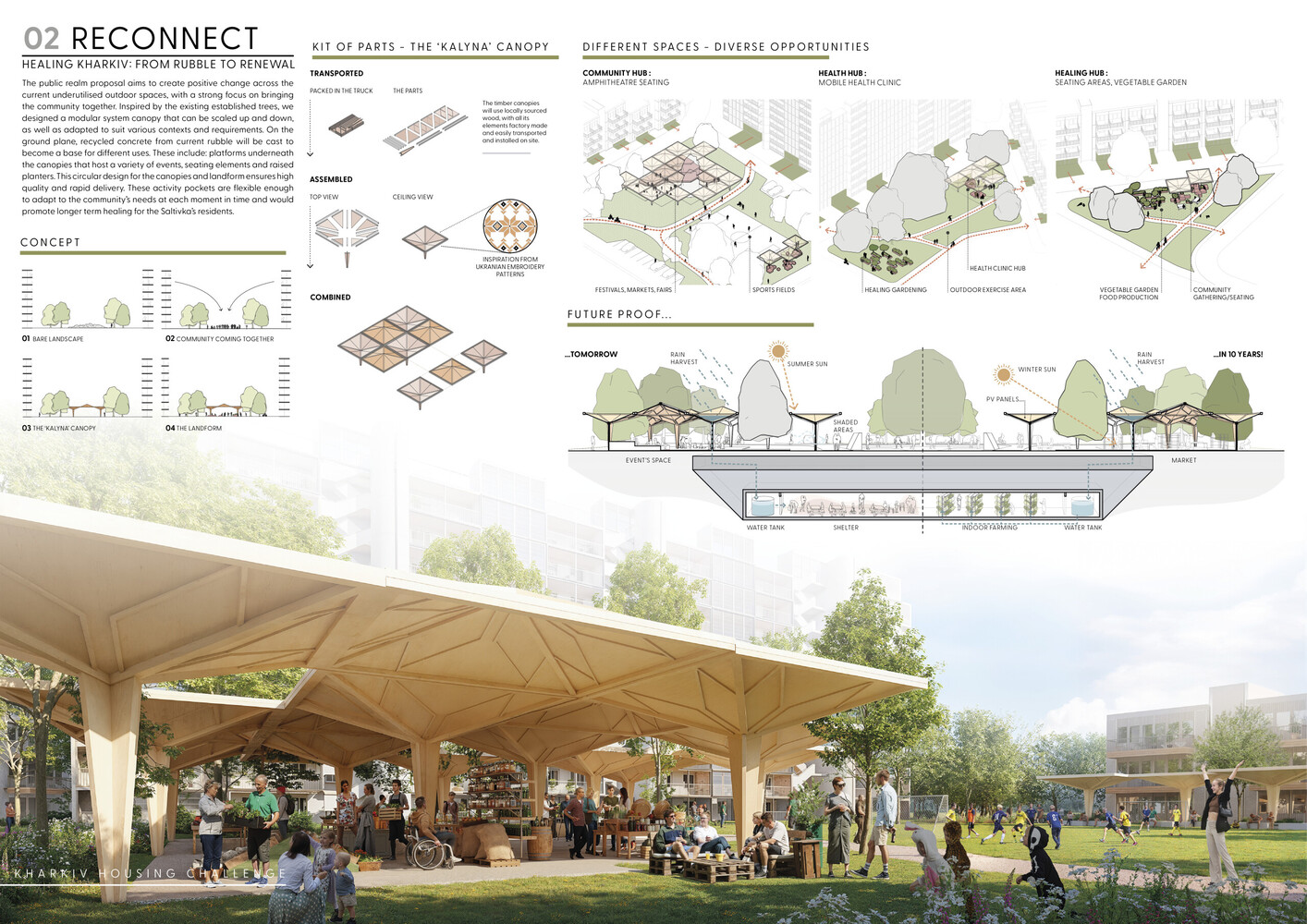
Second Prize Winner
Project title: BLOOMING TOWARDS THE SUN
Authors: Zigeng Wang, from China
The project offers a comprehensive approach to addressing the architectural, economic, social, and cultural challenges of reconstruction. By integrating architecture with agriculture, the project focuses on creating spaces for sunflower cultivation, a symbol of Ukrainian identity, to promote self-sufficiency and food security. It proposes various interventions based on the extent of building damage, incorporating fragments of destroyed structures into public spaces as a reminder of resilience. The design extends housing with new facades, adds planting balconies, and includes community facilities like a library and planting areas. It also addresses water management, modular systems, and construction sequence, with a focus on rebuilding Kharkiv's community and resilience.
_1730884099.jpg/aU9iB6rUIAXPcKsCSiqwSYZeQ97luTbfimvBjDTK.jpg)
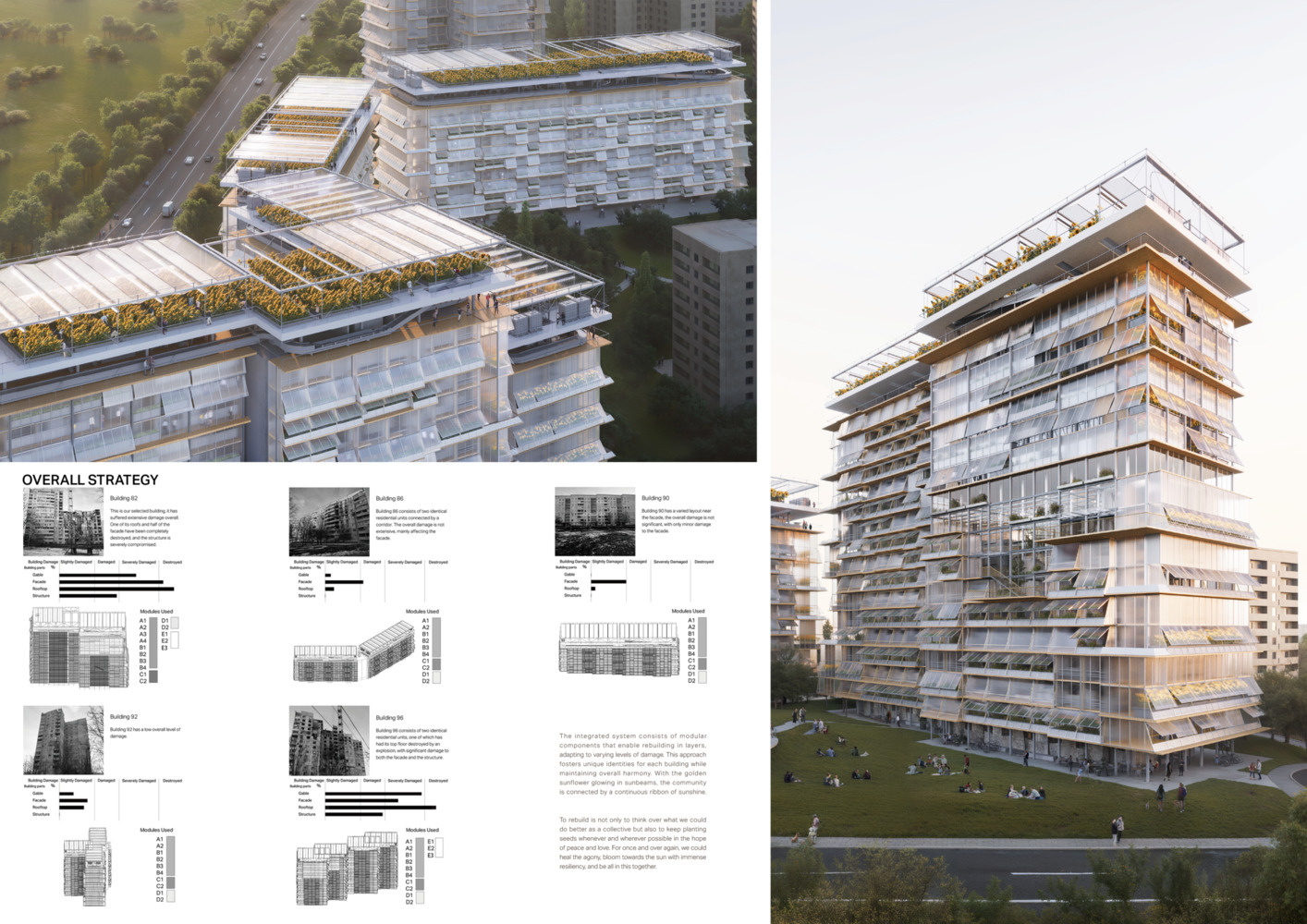
Third Prize Winner
Project title: Modus Vita
Authors: Melek Serra Saral, Oleksandr Kinash, Didem Arman, and Elif Ilgin, of the YTU - Yıldız Technical University, Yıldız Teknik Üniversitesi, Turkey
This project proposes a modular system for underground shelters using high-strength concrete panels, allowing flexible use for public events in peacetime and shelter during conflict. In public areas, partially preserved existing structures and modular additions will support social and commercial interaction, particularly near roadways or public transport. A multilayer insulation system will enhance the energy efficiency of residential facades, and damaged building sections will be replaced with standardized factory-made blocks for continued habitation or conversion into public spaces. The approach balances restoration with adaptability while addressing both residential and community needs.
_1730884212.jpg/H0yIqSjw6vgMeLTBOEjlyssBaU8k5eOfy9X6XzkB.jpg)
